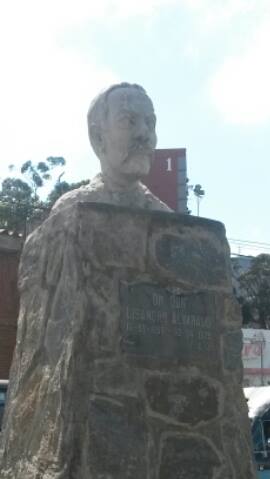Lisandro Alvarado facts for kids
Quick facts for kids
Lisandro Alvarado
|
|
|---|---|

Statue of Lisandro Alvarado located in Lisandro Alvarado Square
|
|
| Personal details | |
| Born | 19 September 1858 El Tocuyo, Venezuela |
| Died | 10 April 1929 (aged 70) Valencia, Venezuela |
Lisandro Alvarado (born September 19, 1858 – died April 10, 1929) was a very important Venezuelan person. He was a doctor, someone who studied nature (a naturalist), a historian (who studies the past), an ethnologist (who studies cultures), and a linguist (who studies languages). He knew a lot about many different things!
Contents
Lisandro Alvarado's Life Story
Lisandro Alvarado was born on September 19, 1858, in El Tocuyo, a city in Lara, Venezuela. His parents were Rafael Alvarado and Gracia Benigna Marchena. He went to school at La Concordia in El Tocuyo. There, his teacher Egidio Montesinos taught him about classic books and Latin. This learning was very important for his future studies.
Early Challenges and Education
In 1871, Lisandro traveled to Trujillo to finish high school. But his family did not have enough money. So, he had to leave school and work as a pharmacist in Barquisimeto. In 1878, he moved to Caracas to study medicine.
While in Caracas, he saw a lot of political activity. This was when Antonio Guzmán Blanco was a very powerful leader. Lisandro also learned about a way of thinking called positivism. This idea focused on science and facts. It was taught by professors like Adolf Ernst. At first, these new scientific ideas were different from his traditional beliefs. But positivism helped him with his research. He used it to study cultures, history, and languages. He shared his early work with friends like César Zumeta.
New Ideas and Travels
Lisandro Alvarado later met Cecilio Acosta. Acosta helped him explore other ideas beyond positivism. In 1881, through Acosta, he met José Martí in Caracas. Martí was a famous writer and thinker. He greatly influenced Lisandro's views on life and science. After finishing his medical degree, Lisandro moved to Ospino in Portuguesa.
He traveled all over Venezuela. He rode donkeys, used canoes, and walked a lot. This allowed him to see the real Venezuela up close. He learned about the landscapes, plants, and animals. He also saw the customs and traditions of the people. He met many different indigenous groups. He even studied their languages directly.
Important Works and Recognition
Lisandro Alvarado also traveled to Europe. He worked there as a consul and a medical delegate. In 1891, he returned to Venezuela. He started publishing many research papers. He wrote about famous Venezuelans and the country's civil wars.
He also published many books about languages. These included:
- Ideas sobre la evolución del español en Venezuela (1903) – about how Spanish changed in Venezuela.
- Glosario de voces indígenas en Venezuela (1921) – a dictionary of indigenous words in Venezuela.
- Alteraciones fonéticas del español en Venezuela (1922) – about how Spanish sounds changed in Venezuela.
- Glosario del bajo español en Venezuela (1929) – a dictionary of common Venezuelan Spanish words.
In 1920, he moved back to Caracas. He worked for the Ministry of Foreign Affairs. Because of his amazing research, he became a member of several important academies:
- The Academy of Medicine in 1905.
- The Venezuelan Academy of Language in 1922.
- The National Academy of History of Venezuela in 1923.
His complete works began to be published in 1958. However, some of his writings are still kept safe by the National Academy of History. On May 14, 1980, Lisandro Alvarado's remains were placed in the National Pantheon of Venezuela. This is a special place where important Venezuelan heroes are honored.
See also
 In Spanish: Lisandro Alvarado para niños
In Spanish: Lisandro Alvarado para niños
 | Tommie Smith |
 | Simone Manuel |
 | Shani Davis |
 | Simone Biles |
 | Alice Coachman |

